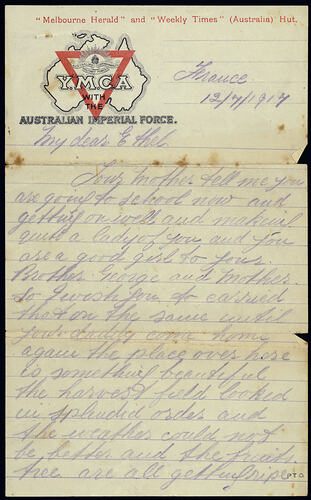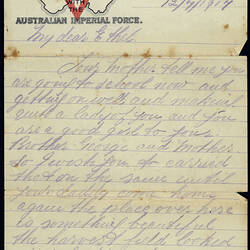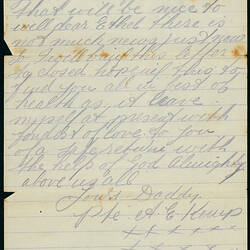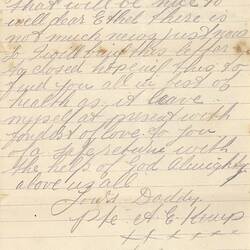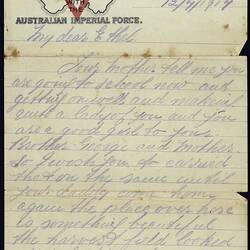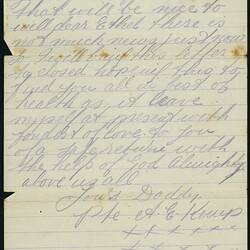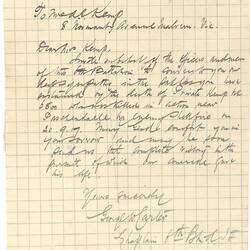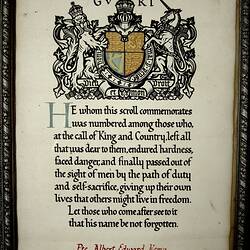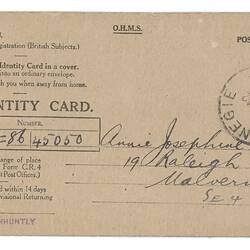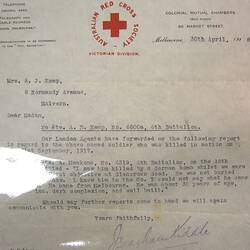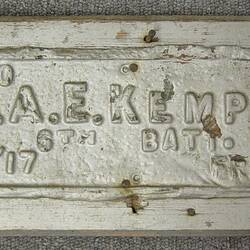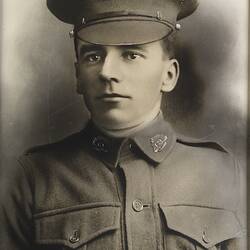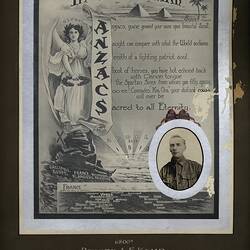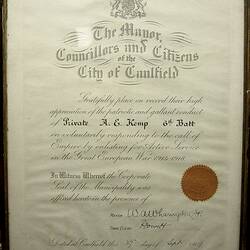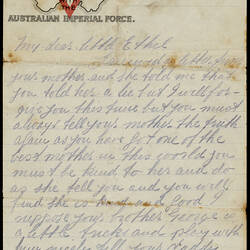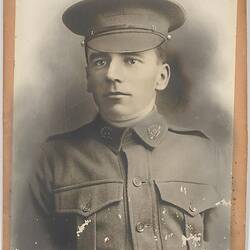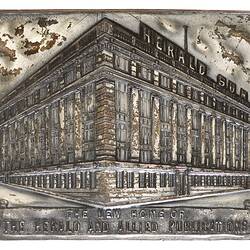Summary
Hand-written letter on Australian Imperial Force letterhead paper to six-year-old Ethel Kemp from her father Private Albert Edward Kemp. Albert Kemp was serving on the Western Front during World War I. He was killed nine weeks later, on 21 September 1917. His body was never found.
Albert notes that Ethel is now at school, and is 'getting on well' and becoming 'quite a lady'. He hopes she is being good to her brother George. He goes on to describe Belgium as 'something beautiful', with a harvest field 'in splendid order', beautiful weather and ripening fruit trees. He says that there is not much news, and hopes to find her 'in the best of health as it leave myself at present'. He signs off hoping for 'a safe return with the help of God Almighty above us all, Yours, Daddy'.
Physical Description
Hand-written one-page letter, on off-white lined paper (inscribed on both sides). Printed at top with outlined shape of Australia, rising sun symbol and red triangle printed at top - representing the Australian Imperial Force, the YMCA and the Australian Commonwealth Military Forces - accompanied by inscriptions (see below). Paper yellowed, with foxing and deep creases.
Significance
Albert Edward Kemp was a 32-year-old butcher, living at 8 Normanby Ave, Caulfield and married to Annie Josephine, when he enlisted. Born in South Yarra, he was a small man, 5'4½", and weighed only eight stone. He and Annie had a daughter, Ethel Mavis, and a son, George Percival. Albert enlisted at Royal Park on 4 October 1916, and was assigned to the 22nd Reinforcements, 6th Battalion - regimental number 6800. His battalion left Melbourne 25 October 1916 - just 21 days after Albert enlisted - on the 'Ulysses' with two officers and 150 O/Rs. The ship arrived in Plymouth three days after Christmas.
A little over one month later, on 1 February 1917, Albert was disciplined for being absent without leave from midnight and was apprehended the next afternoon. He forfeited 18 days' pay for his offence. He was shipped to France on 27 March, and probably went into action in the trenches. On 13 July Albert was again in trouble, this time for disobeying orders from a superior officer. (It is unclear what his punishment was, but "48 hours" may refer to imprisonment). Two months later, on 21 September 1917, Albert died in the trenches in Glencorse Wood, Belgium. He is buried at 29 The Ypres (Menin Gate) Memorial, Belgium. His name is located at panel 47 in the Commomorative Area at the Australian War Memorial.
Some time in 1918, Albert's belongings were sent in error to a family who had lost a member by the same name in Wonthaggi, and Annie received that man's belongings. In June she was asked to return the other Pte Kemp's belongings. Annie received a war pension, but appears to have fallen on hard times - suggested by her need for assistance with a grocery bill approved in one of the documents. She moved to 19 Raleigh St, Malvern in 1922. It is unclear what happened to Ethel, as only George is mentioned from the early 1920s. Further research is required.
The family's home at 8 Normanby Ave is still standing, largely with original façade; their street overall is also largely original.
More Information
-
Collection Names
-
Collecting Areas
-
Acquisition Information
Purchase from Mr Jeff Kemp, 07 Dec 2006
-
Author
Private Albert E. Kemp - 6th Battalion, Australian Imperial Force (AIF), France, 12 Jul 1917
-
Addressed To
-
Organisation Named
-
Organisation Named
-
Organisation Named
-
Organisation Named
-
Place Used
-
Inscriptions
Printed text at top: '"Melbourne Herald" and "Weekly Times" (Australia) Hut./AUSTRALIAN' Within rising sun insignia: 'COMMONWEALTH/MILITARY FORCES'. Overlaying outline of Australia and red triangle: 'Y.M.C.A./ WITH / THE / AUSTRALIAN IMPERIAL FORCE.' Hand-written text: 'France/12/7/1917 / 'My Dear Ethel/Your mother tell me you/are going to school now and/getting on well and making/quite a lady of you and you/are a good girl to your/Brother George and Mother/So I wish you to carried/that on the same until/your daddy come home/again the place over here/is something beautiful/the harvest field looked/in splendid order and/the weather could not/be better and the fruit/tree are all getting ripe/for the boys to have a/good feed of them so/that will be nice to/well dear Ethel there is/not much news just now/so I will bring this letter/to closed hoping this to/find you all in best of/health as it leave/myself at present with/fondest of love to you/of a safe return with/the help of God Almighty/above us all/Yours Daddy. / Pte A.E. Kemp / XXXXX' [6 rows of kisses follow].
-
Classification
-
Category
-
Discipline
-
Type of item
-
Overall Dimensions
12.4 cm (Width), 20.3 cm (Height)
-
Maximum dimensions
124 mm (Width), 203 mm (Height)
Measurement From Conservation.
-
References
National Archives of Australia hold records relating to Albert Kemp - Series number B2455, Barcode 7368872
[Book] Hutchinson, Garrie. 2009. Remember Them; a Guide to Victoria's Wartime Heritage., 30-2 Pages
-
Keywords
Death & Mourning, Domestic Life, Wars & Conflicts, World War I, 1914-1918, Making History - Kemp Mourning Collection, Making History - War Diaries and Correspondence
